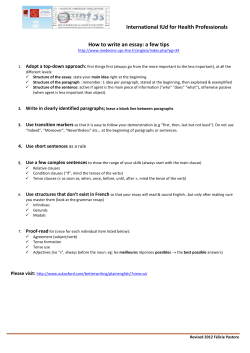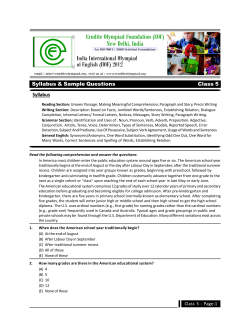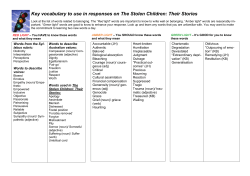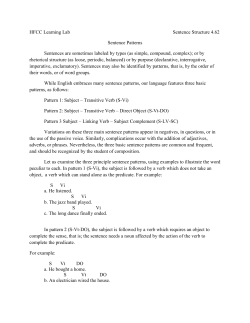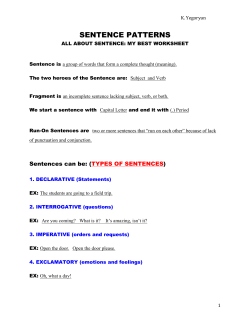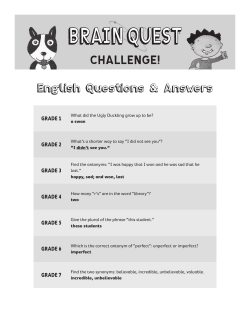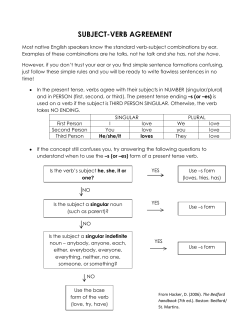
How to be a good academic writer, or how to... eschew terminological obfuscation!)
How to be a good academic writer, or how to save trees! (and eschew terminological obfuscation!) Notes from the seminar presented by Kate Leeson and Paul Wallace Thursday 5 March, Murray House, Magill Campus Elements of good writing Know what you want to say. Be clear. Be concise. Use good grammar. What, why and for whom What do you want to say? Decide what you want to say in your document before you start writing it. This will assist you to structure the document. There will be less temptation to stray from your main point(s). What is the purpose of academic writing? You write to communicate your research findings, your ideas, your brilliant insights. You can communicate your knowledge by using plain English, sentences that are not too long and mainly use everyday words. In fact, you will communicate more effectively in concise, plain English than in obscure, convoluted, jargon-ridden writing. Know your audience Consider who your audience is. You might use slightly different language in a seminar paper delivered to your colleagues at UniSA than in an article you intend to submit to an international journal, or something intended for non-specialists. For example, will your audience know the meaning of the acronyms that you use? Do you need to spell them out? Have you included a general reference to ‘the government’ or to ‘this country’, for example, in some writing that will be published outside Australia? 1 Clarity Effective communication requires • • • plain English concise sentences everyday words. Everyday words Good writing uses everyday words: ‘buy’ not ‘purchase’, ‘start’ not ‘commence’. Do you really need to use ‘utilise’? What’s so wrong with ‘use’? Why use ‘ascertain’ for ‘find out’, ‘commencement’ for ‘start’, ‘completion’ for ‘end’ or ‘cognisant’ for ‘know’? Pretentious or jargon-filled writing How much jargon (specialised language) do you need to use? Jargon includes the language that is specific to your area of academic expertise. This can be very useful in your writing. After all, you are building on the work of generations of other people working in your discipline. But you need to think about whether your audience has the same academic background as yourself and whether they will understand the jargon you are using. It can irritate readers who have to scurry off to find a definition, interrupting their reading and perhaps sending them to another, easier to read publication. Sometimes there is no alternative to jargon; there is no simpler, more common word available, so you must use that word, but please define it in the first instance, a footnote or endnote will suffice, and the reader will know that you care about making your work accessible. Remember that the point of writing is to communicate with your readers, not to impress them. If your writing starts to include a lot of management speak or technobabble then you are probably confusing your audience. Operationally, teaching effectiveness is measured by assessing the levels of agreement between the perceptions of instructors and students on the rated ability of specific instructional behaviour attributes which were employed during course instruction. Ambiguity Sarah told the student that she was mistaken. (Is Sarah or the student mistaken?) The children’s lunches are all packed and they’re ready to go. (The children are ready or the lunches are ready?) The number of women with infants in the workforce has grown dramatically during the last decade. When John had finished painting Sarah made him a cup of tea. The patient was referred to a psychologist with severe emotional problems. We will serve wine to the guests in paper cups. 2 After Sarah finished her degree with the help of her favourite lecturer she found work at the university. (Did the lecturer help her finish her degree or help her find work?) Pretentious writing Pretentious writing also gets in the way of good communication One would hesitate, however, to sip from the same poisoned chalice as those who would speciously crusade the assertion that literature is quintessentially socially functional. If in doubt, check Make sure you know how to use the words you are using. For example, ‘methodology’ is the study of methods. Interviewing people is a method, not a methodology. ‘Alternate’ is a verb meaning to switch between two states, for example, the weather is alternating between wet and dry. Alternatively you could say that wet weather is the ‘alternative’ to dry weather. Brevity Redundant words Redundant words are words that you do not need because they do not add any extra meaning. Including redundant words in your writing can in fact obscure your meaning. Concise writing is much easier to understand. Redundant words distract the reader from your main point and diffuse the impact of your message. It is a fact that … It is rarely the case that … It was the cat that sat on the mat. This is a subject that is very difficult. (This subject is very difficult.) provide an explanation (explain) engage in reflection (reflect) is a reflection of (reflects) owing to the fact that (because) advance the argument (argue) cooperate together (cooperate) 3 we will consider the question as to whether (we will consider whether) The reason I finished the report late was because … (I finished the report late because …) Long, wandering sentences Don’t try to fit too much information into one sentence, and don’t change direction mid-sentence. Long, wandering sentences are hard on the reader. They also give the impression that you don’t really know what you want to say. On the other hand, if all of your sentences are short and contain only one idea your writing will seem stilted. Good writing is made up of sentences of a variety of lengths, with one or two main ideas in each. This is an example of a sentence that tries to say too much: The program is of vital importance, and would assist in creating a significant improvement in the quality of life of disabled people of all ages, not least as access to transport is a key requirement in education and employment, as well as for social, leisure, health, shopping and other activities, and would therefore promote social inclusion, public participation and individual health and well-being. To shorten a long sentence: Identify the separate ideas. Use one or two ideas per sentence. Put qualifiers and modifiers into different sentences. Put explanations into separate sentences. In explanation of what we mean by qualifiers and modifiers: When you start with a simple sentence like ‘The cat sat on the mat’ you might want to add extra information. This is fine except when you try to put too much information in one sentence: ‘In contrast to her usual habit, the cat, who was almost eleven years old, sat, purring happily, on the mat, which was looking worn around the edges’. Style Voice There are different opinions on whether academic writing should include ‘I have written …’ and ‘I argue’, etc. rather than ‘The present author has written …’ or referring to oneself in the third person. One approach values clarity more and one values appearing objective. What is acceptable may depend on your discipline and the publisher. That said, it is generally better to have an actor on the stage, so if possible, use the first person: ‘In this chapter I (or we) outline…’ rather than ‘this chapter outlines …’. Contractions, abbreviations, colloquial language and clichés Academic writing requires a certain level of formality. Use ‘do not’, not ‘don’t’; ‘they are’, not ‘they’re’. Only use ‘e.g.’, ‘i.e.’ and ‘etc.’ in brackets or footnotes. In text use ‘for example’, ‘that is’ and ‘and so on’. 4 If you use a colloquialism or cliché, have you used it for a reason? Does it improve your writing? Will all of your readers understand it? (Are you hoping to publish in an international journal or are you writing a report for a limited local audience?) Using nouns as verb and verbs as nouns Do you really need to use that noun as a verb? Many words, of course, can be used as either nouns or verbs. And the use of words as nouns or verbs changes over the centuries. But using nouns as verbs before they are widely accepted into formal English will not improve communication and will make your writing seem awkward, turning off some readers. The network crash impacted the students. Let’s action that before the next meeting. The athlete finally medalled at last year’s games. Similarly, do you really need to use that verb as a noun? We need to work on the disconnect between staff and students. ‘Quote’ is used as both a noun and a verb in general speech now but in formal writing use ‘quotation’ for the noun. Composite naming Composite naming is the stacking of words to produce a single name or noun phrase. It is common in political and bureaucratic literature and very common in the health field. Word stacks or strings of nouns can be useful for shortening a long phrase that would be cumbersome when frequently repeated. However, word stacks can often be ambiguous or incomprehensible. For example, By requiring all animal shelter "pet surrender" clients to complete and sign clearly marked unwanted pet surrender forms which include a consent to perform killing of unable to be rehomed animals, the reality of surrendering ownership at animal shelters might be better appreciated. rewritten: If all clients surrendering pets to animal shelters are required to complete and sign a clearly marked surrender form which includes a consent to kill animals for which it is not possible to find a home, they may better appreciate the reality of surrendering their animals at animal shelters. If composite naming can’t be avoided, a useful option is turning it into an acronym. In the health field, this is routine. But remember to define it at the first use. 5 Passive versus active tense Writing in the active tense is clearer and more direct than writing in the passive tense. Also, sentences in the passive tense may contain less information than those in the active sense, as the subject of the verb is not always specified. The mat was sat on by the cat. It was considered by Smith (2005) … Smith (2005) thought … Sometimes academics use the passive tense to avoid writing in the first person. This can create ambiguity. Sometimes academics use the passive tense when they haven’t found the references they need. This is lazy writing. Sometimes it is not clear which of these two things they are doing. It has been argued that … I argue that … Smith (2005) and Jones (2000) argued that … Sometimes you really don’t know the subject of the verb. The victim had been strangled. Recommendations in a report are often phrased as ‘A seminar should be presented to teach academics to write well’. This phrasing is reasonable if you really have no idea who should present the seminar. But your recommendation will have more impact if you write ‘The Hawke Research Institute editors should present a seminar to teach academics to write well.’ Strong statements or qualified statements? Don’t be scared to make strong statements where they are warranted. The following sentence sounds weak and indecisive: It could be argued that in some contexts this policy will not be beneficial to the majority of the target population. Decide what you want to argue, state it clearly, then back it up. This policy will not help everyone. 6 Grammar Inconsistent tenses Usually you will be writing about research you did in the past or works that were written in the past. In these cases use the past tense. Saying that ‘Macdonald (2001) believes that …’ eight years after the event implies that Macdonald still believes that, and ignores the possibility that Macdonald has since changed their mind. Use the present tense if you are describing a continuing situation. Don’t swap from one tense to another without reason. Smith (2005) argued that … The Education Minister believes … It is OK to write that someone wrote (past tense) about a continuing situation (present tense). For example, ‘He wrote that the sun rises every day’. Problems with modifying phrases Having failed, the exam had to be done again. (It is the student, not the exam, who failed.) Taking up cricket at an early age, commentators have said Smith is one of Australia’s best. At the age of twelve, my mother taught me grammar. (The mother probably wasn’t twelve at the time.) Giant African snails have invaded Long Island. Boasting a voracious appetite and stocked with both male and female sex organs capable of producing up to 1000 offspring per year, officials at the US Department of Agriculture are warning Long Islanders to report any sightings of the oversized escargot immediately. (Apparently this one really did appear in a New York newspaper.) Sentence fragments and run-on sentences The article was very interesting. But not well written. A sentence must contain a verb. ‘But not well written’ is only a fragment of a sentence. We use sentence fragments in speech and we might think in fragments. Authors of f iction might deliberately use sentence fragments in dialogue. But they are not part of formal writing. The article was concise, it was also well constructed. You can’t join two sentences together with a comma alone. They could be separate sentences. They could be joined with a semi-colon if they are sufficiently conceptually linked. Or you could use a joining word like ‘and’. 7 Split infinitives An infinitive is the form of a verb that contains the word ‘to’, eg ‘to be’, ‘to write’. A split infinitive has a word or words between the ‘to’ and the rest of the verb: ‘to boldly go’. These used to be anathema, but nowadays they are not quite as severely frowned upon, although opinions vary. If you feel that they add to your writing by all means use them, but do so with caution as they can end up saying other than you intended and make your writing awkward. Don’t use more than one word within the infinitive. Consider: ‘we will need to with all despatch attend to his enquiry’ vs ‘we will need to attend to his enquiry with all despatch’. That and which Use ‘that’ when the information is essential to the meaning of the whole sentence. This is the hat that my mum bought for me. (‘That my mum bought for me’ defines the hat.) Use ‘which’ when the information could be left out. This is my favourite hat, which I got for my birthday. ‘That’ is going out of fashion in this context, but sometimes using ‘which’ instead changes the meaning. The recommendations that were likely to cause embarrassment were removed from the report. The recommendations, which were likely to cause embarrassment, were removed from the report. Pronouns To work out whether a sentence should end with ‘me’ or ‘I’, think of the words that are left out. They are offering you a bigger salary than I. (i.e. than I am offering you) They are offering you a bigger salary than me. (i.e. than they are offering me) When there is a joint subject or object remove some words then see if the sentence sounds awkward. Sarah and I are writing an article together. The three of us – Sarah, John and I – present writing seminars. The Vice-Chancellor presented awards to Sarah and me. 8 Parallel grammar in lists Make sure that lists are consistent. Check that each point follows on naturally from the introductory clause. The following is not a good list: To be a good writer you need: good note-taking practices to be persistent it helps if you read widely. The points can be phrases or sentences, but not a mixture of both. Try to phrase the beginnings of your points as all nouns or all verbs. This also applies to a list that is not presented as dot points. This is not a good list: As a writer you will need talent, to be ambitious and persevering. Spell checkers Use your spell checker but don’t trust it. Don’t Americanise your spelling just because your computer says you should. Set the correct language. Your computer won’t pick up words that are spelt correctly but used incorrectly. It will tell you to put a comma before ‘which’ even if you meant ‘that’. Capital letters Use capital letters only for a proper name, not when you refer to something using the generic part of its name. The University of South Australia is an equal opportunity employer. The university’s policy is clear. Melbourne and Adelaide universities have devised a joint scheme. The federal government has no particular policy on this matter. The Government of South Australia claimed … The South Australian government claimed … The state government claimed … You can use capitals for an abbreviated version of an official name (the Reserve Bank, short for the Reserve Bank of Australia, but ‘the bank’). 9 Comma problems Commas can make your writing clear by separating different ideas and items, so eliminating ambiguity and making a sentence easier to read. If you cook, your husband might do the dishes. But they are often used incorrectly, as in these sentences. The university senior management, after much consideration announced a new promotions policy. (The correct version would have no commas at all, or else a second comma after ‘consideration’.) Sarah finished writing her article, and after watching television for a while, went to sleep. (Correct version: move the comma from immediately before the ‘and’ to immediately after.) Do not use a single comma between a subject of a verb and the verb. Commas are often used in pairs to separate out one clause from the main part of the sentence. But make sure you put them in the right place. Commas can also change your meaning. Compare However, they climbed the hill. (Nevertheless, they climbed the hill) with However they climbed the hill. (In some way they climbed the hill) Hyphens Hyphens are often used unnecessarily. Do not use them for nouns made up of two words. Use them for compound words such as self-improvement or multi-skilling, and for compound adjectives when their omission creates ambiguity, for example, child-care centre vs child care centre—does the latter refer to some care centre that has a parent centre? Or high-school student vs high school student (on a high by means unknown). If the meaning is clear without the hyphen, then leave it out. 10 Quote marks We have included quote marks here because some authors use them too often. Quote marks are useful when you are actually quoting someone, of course. But some authors use them to add emphasis or to draw attention to a phrase. This is unnecessary and only serves to interrupt the flow of the reader’s eyes along the line of text. The only time it is useful to enclose a word in quotations is if you are using a word in a novel sense or you are coining a new word. In this case, only use the quote marks for the first instance of the word. If you want to emphasise a word use italics, but do this sparingly. Uses • • • • quotations chapter and article titles words used in a novel sense or new words or phrases if the use or definition of the word itself is under discussion Can anyone in the class define ‘karst’? Not here: • • The so-called ‘policy’ delivers nothing in reality. Key features of the ‘previous’ system were … Apostrophes An apostrophe is used to show possession and to show the omission of letters or figures. Many people have difficulties with the possessive apostrophe. The apostrophe goes before the ‘s’ if the word did not end with an ‘s’. The student’s jacket hung on the chair. (one student) I write children’s books. (plural children, but the word doesn’t end in ‘s’.) The apostrophe appears after the ‘s’ for a plural noun ending in ‘s’. It is my parents’ anniversary. (two parents) The Smiths’ farm is for sale. (It belongs to the Smiths) You do not need an apostrophe with a plural noun that is descriptive, not possessive. Please sign the visitors book. Do you have a drivers licence? Do not use an apostrophe just because something is plural. Do you like 1980s music? The VIPs are here. There is an exception to this: 11 Dot the i’s and cross the t’s. Mind your p’s and q’s. Dashes There are three types of dash commonly used: the hyphen ( - ), which is used to connect two words to make a compound word (noninvasive, self-improvement) the en-rule ( – ), which is used to connect two words of equal status (work–life balance) or define a range (5–6 years) the em-rule ( — ), which is used as a parenthetical punctuation mark (policies may change the decision-making environment—water licensing reform is an example—or provide …), to mark an abrupt change in the sentence (James was heading off to China for a holiday— but that is digressing …), and to further explain something (Sheena shrunk further into her anorak—the wind was biting). Many publishers use an en-dash with a space either side instead of an em-dash. As a rule, there is no need for you to worry about how to insert en-dashes and em-dashes—if you wish to use them, then simply type two consecutive hyphens and the editor or typesetter will know what you intend. If you want to do it yourself hold down Ctrl while you press the hyphen key on the number pad (for an en-dash) and Alt+Ctrl+ hyphen on the number pad for an em-dash. Alternatively, you can go to ‘Insert’, then ‘Symbol’, then ‘More Symbols’, then ‘Special Characters’. British or Australian versus American punctuation Generally your editor will look after this for you provided that they are aware of which journal or publisher you are submitting your work to. However, if you wish to concern yourself with this, the main differences are in the use of quotation marks and punctuation of lists. American writing uses double quote marks to open a quotation, followed by single quote marks for nested quotations. When quoting from an article or speech, American writing places the full stop/comma/etc. within the quote marks and Australian and British writing places the final quote mark before the punctuation mark, except when the punctuation mark is part of the sentence. List punctuation in American English is as follows: the cat sat on the mat, the cat was red, and the mat was green. For Australian and British English, omit the last comma unless the second last item is complex and contains an ‘and’ or an ‘or’. 12 Effect or affect The words effect and affect have different meanings and cannot be used interchangeably. What is the effect of the policy on childcare centres? (noun, means the consequence) How will the policy affect childcare centres? (verb, to have an influence on or produce a change in something) Effect can also be a verb and affect can be a noun, but the meanings are different. How are we going to effect a change in attitude in privately owned centres? (to bring about or make happen) Affect as a noun is less commonly used and means feeling/emotion. These two sentences are both correct and mean different things: A glass of brandy will affect his recovery. (alter the prospects of his recovery) A glass of brandy will effect his recovery. (bring about his recovery) Impact The use of this word (which is really a word for a concussive collision) has ballooned out of all control. Perhaps this started as a result of some people being unable to understand the difference between affect and effect. It is not uncommon to hear a journalist or politician use impact several times in one sentence. The effect is stultifying and a lot of subtle meaning is lost. Consider using words such as influence—a little less forceful, effect—more forceful, It exists Ajax is only a name given to a set of tools that were previously existing. is better as: Ajax is only a name given to an earlier set of tools. or: Ajax is only a name given to a pre-existing set of tools. 13 A few aphorisms 1. Don’t use commas, which aren’t necessary. 2. Reread your work to see if you any words out. 3. Avoid clichés like the plague. (They’re old hat.) 4. Employ the vernacular. 5. Eschew ampersands & abbreviations, etc. 6. Parenthetical remarks (however relevant) are unnecessary. 7. It is wrong to ever split an infinitive. 8. Contractions aren’t necessary. 9. Foreign words and phrases are not apropos. 10. One should never generalise. 13. Don’t be redundant; don’t more use words than necessary; it’s highly superfluous. 14. Profanity sucks. 15. Be more or less specific. 16. Understatement is always best. 17. Exaggeration is a billion times worse than understatement. 18. One-word sentences? Eliminate. 19. Analogies in writing are like feathers on a snake. 20. The passive voice is to be avoided. 21. Go around the barn at high noon to avoid colloquialisms. 22. Even if a mixed metaphor sings, it should be derailed. 23. Who needs rhetorical questions? Useful writing resources Snooks & Co, Style manual for authors, editors and printers, 6th ed, John Wiley & Sons Australia, 2002. (Commonly called the Government style manual.) Macquarie dictionary. There is an online version that costs only some $27 per annum: <www.macquariedictionary.com.au> This is particularly useful as you can search for a word or words that are similar and it also gives you access to a very helpful thesaurus. Margaret McKenzie, Australian handbook for writers and editors: grammar, usage and punctuation (various editions and reprints). Lynne Truss, Eats, shoots and leaves: the zero tolerance approach to punctuation, Allen & Unwin, 2005. Plain English Campaign <www.plainenglish.co.uk> is a useful resource on how to write to be understood. It’s primarily aimed at people who are writing government and business documents for consumption by the public. Academic Skills Program at the University of Canberra <http://www.canberra.edu.au/studyskills/writing> Mainly aimed at students, but may be helpful to staff as well. A Google search on academic writing will turn up hundreds of pages, mostly aimed at assisting university students with their writing, but all the same some might be useful. 14
© Copyright 2025
